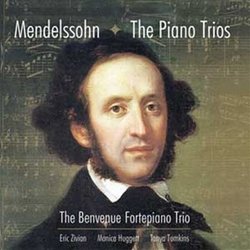Well worth a listen!
Evan A. Evanson | Wisconsin (no cheesehead jokes, please) | 02/23/2010
(4 out of 5 stars)
"These are first-rate performances in themselves, and the opportunity to hear these delightful trios on something approaching the instruments Mendelssohn himself would have heard is not to be passed up. Having just performed the first trio (which, oddly, comes second on the recording), I was fascinated - though not really surprised - to find that the balancing problems our trio struggled with seem to be obviated when the piano part is played on a fortepiano. It really puts the strings on an equal footing with the keyboard, and the piano can really support, rather than overpower, when it's accompanying.
There's a passage near the end of the second movement of the first trio where the cello starts up a pizzicato walking bass, then the keyboard takes over while the cello goes on to play arco with the violin. On modern instruments, the piano is simply a more imposing presence when it takes over the bass line, with its long ringing tones; with a fortepiano, the transition really becomes a hand-off, like a baton from runner to runner in a marathon.
While it's possible to miss the more singing quality of the modern piano in the Andantes if you're not used to the sound of the fortepiano, the scherzos of both movements are particularly clearer and playful in this recording."

